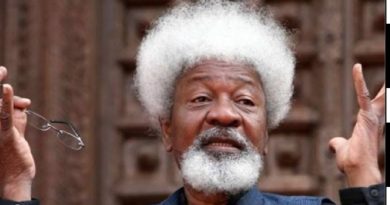THE GRAND OPERA OF CORRUPTION: Two Tenors Hit Sour Notes
By Iyke Ezeugo
The Nigerian stage illuminates a spectacle both grand and grotesque. Two figures, titans in their own right, strut and fret: the former Governors of Kogi and Central Bank. But theirs is not a noble opera, filled with soaring arias and dramatic crescendos. This, dear audience, is a farce, a tragicomedy of epic proportions, where the only melody is the clinking of stolen coins.
Act I: The Kogi Tenor Dreams of Home
First, we meet the Kogi tenor, a man yearning for a familiar stage. His voice, once booming with pronouncements of progress, now croaks with claims of illness. He pines for his palatial Lokoja estate, a venue far more comfortable for his upcoming legal battles. Ah, the poor soul! Eight years of swimming in a sea of gubernatorial wealth have left him, you see, utterly exhausted.
But whispers abound, dear audience. Some murmur of a thwarted presidential ambition, others gasp at the astronomical sum – 80.2 billion naira, some say, and a hefty sum in hard currency – that vanished under his watch. Possibly not directly into his agbada pockets. For the hard currencies, there are begging questions whether it vanished entirely into thin air, or some found their ways to distant lands, funding the Ivy League dreams of his progeny? The audacity! But fear not, for the EFCC orchestra is tuning up. They may start with the smaller instruments, those whose thievery pales in comparison, but their gaze surely doesn’t seem to be in a hurry for leaving the Kogi tenor direction.
Act II: The CBN Baritone Seeks a Foreign Chorus
And now, the spotlight shifts to the baritone of the Central Bank. Once the guardian of our national coffers, his voice now trembles under the weight of accusations. 4.5 billion usd and 8 billion naira! Tales are told of printing presses running amok, colors changing on naira notes, and mountains of cash stockpiled while the common man begged for crumbs. The tables have turned, haven’t they? The maestro who once wielded the financial baton now faces the harsh gavel of justice. Some in the audience cry vendetta, while others point to the curiously oversized Bible clutched in his hand, a prop perhaps concealing more than mere scripture.
The drama for who takes him home between the SSS and Prisons is an interesting watch. Who knows the hidden treasures in that Bible he is clinching that each of these contenders have seen and is chasing after! And lo, a plea bargain emerges from the pit – a paltry sum offered in return for freedom to go and enjoy the loot with merriment. A mere pittance, a single note in the grand symphony of his corruption.
But the baritone craves a different melody now. He seeks a medical sojourn abroad, a foreign chorus to soothe his troubled soul. Surely, no Nigerian physician can heal the wounds inflicted by such “national service” and heavy self-selected reward. Let him go, the audience whispers, lest prying eyes delve deeper and expose a score far more damning than we dare imagine.
The Farce Concludes
Thus, the opera reaches its farcical climax. Trials become location-dependent, medical leaves span continents, and the very notion of public service dissolves into a cacophony of self-serving arias. Leadership in Nigeria, they scoff, is but a stage for looting, a platform for intrigue, and a showcase of unmitigated gall!
The music fades, the lights dim, but the echoes of this grand corruption linger. A stark reminder that in the grand opera of Nigerian politics, some voices sing only for themselves, leaving the true melody of progress perpetually unheard.
Let us not be fooled, however. These are but the latest tenors to take the stage. The Kogi tenor and the CBN baritone are not the only ones, nor are they the worst. The EFCC drumbeat echoes on, a relentless rhythm that will surely summon others to dance, assuming that this their flexing is not only for this night show. One can only hope that those who currently thump their chests and clutch their oversized Bibles are not feeling a twinge in their left hands.
Perhaps EFCC can look around the stage, select a few others in the same dance class, for there are surely plenty to choose from. Let them all also have similar opportunities to take their turns to dance their own dance as EFCC beats the drum; let them have their own opportunities to perform their elaborate charades before us, a captivated audience. Let the drama unfold while the spectators still have the zeal and energy to savor




